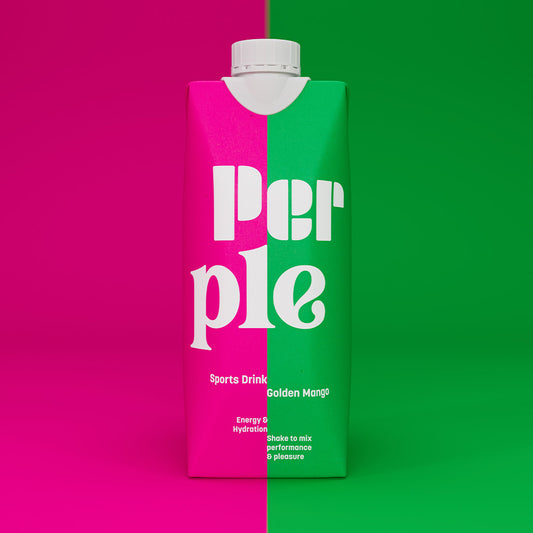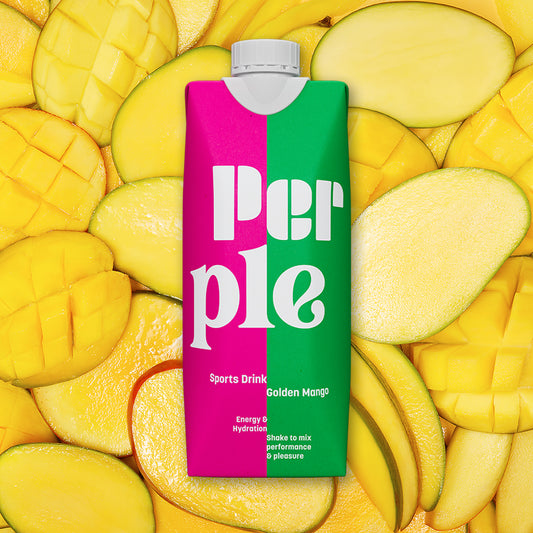Why You Need To Replace Energy Drinks
How Perple Compares:
The benefits of Perple Sports Drinks
Why we don’t use typical energy drink ingredients.
The stuff that's a health hazard:
Maltodextrin (from GMO corn)
Maltodextrin (from GMO corn)
Maltodextrin is used as the main ‘energy source’ in leading energy gels & energy drink powders. It's a cheap bioengineered white powder, introduced in the 70s as a food thickener in processed foods. Like instant puds and sauces.[33]And much of it is made using GMO Corn.[34]Regulators might have considered it as safe in the past, but in the context of it being used in 'low moderation'.
But our exposure to Maltodextrin today, is higher than it has ever been. Especially with its high inlcusion in sports nutrition and drinks, which we now consume in greater quantities, and more often.
The problem is that Maltodextrin makes our stomachs more susceptible to disease, owing to changing the balance of gut bacteria. Inflammatory bowel diseases like Crohn's or ulcerative colitis.[1][2][3]
Artificial Preservatives (from Petrol or Coal)
Artificial Preservatives (from Petrol or Coal)
The stuff that doesn't work:
Caffeine
Caffeine
Caffeine comes from coffee beans, cacao beans, tea leaves, and gaurana berry, to make it sound more exotic. But it isn’t real energy. It heightens nervous systems giving us a fake or artificial rush of energy. While this can help to drive more effort in exercise, it maxes out at one tall starbucks coffee (a 200mg dose) and can’t be sustained. One cup in the morning will last throughout the day and maximize any performance benefits. Then, to supplement at excess doses won’t necessarily give you any added benefit, and you run the risk of side effects. Such as irritability, tremor, heart-rate increases, headaches and fatigue.[8] [9] [10]
Taurine
Taurine
Antioxidants
Antioxidants
There is no doubt among researchers that prolonged and intense exercise causes oxidative stress. Which in turn can result in increased muscle fatigue. Therefore, some promote anti-oxidant supplementation during exercise, to overcome these effects. Yet, after a thorough review of the scientific literature, there is little evidence to conclude that this approach helps.[11][12] In fact, we find strong evidence that supplementation can actually inhibit the body’s natural biological defences to oxidative stress. What this means is that natural adaptive responses by your muscles can be lessened, and your capacity for endurance reduced.[13][14][15] If you’re consuming well-balanced daily meals, you should be receiving adequate supplies of these anti-oxidants.
Vitamin B
Vitamin B
There is sound scientific evidence to conclude that B-Vitamins play an important role in energy metabolism. Then, it seems reasonable that any deficiencies might lessen exercise performance. But, if you’re getting everything you need from your normal diet, excess doses above recommended upper limits, could be harmful. For instance, excess B2 can cause diarrhoea and polyuria, B3 liver problems, gout and irregular heartbeat, and B6 nerve damage.[16][17][18] When it comes to vitamins, we believe you should only supplement for known deficiencies. Otherwise toxic doses can result in serious health problems.
References
References
- Arnold AR, Chassaing B. Maltodextrin, Modern Stressor of the Intestinal Environment. Cell Mol Gastroenterol Hepatol. 2019;7(2):475-476.
- Nickerson KP, McDonald C. Crohn’s disease-associated adherent-invasive Escherichia coli adhesion is enhanced by exposure to the ubiquitous dietary polysaccharide maltodextrin. PLoS One. 2012;7(12):e52132.
- Laudisi F, Di Fusco D, Dinallo V, Stolfi C, Di Grazia A, Marafini I, Colantoni A, Ortenzi A, Alteri C, Guerrieri F, Mavilio M, Ceccherini-Silberstein F, Federici M, MacDonald TT, Monteleone I, Monteleone G. The Food Additive Maltodextrin Promotes Endoplasmic Reticulum Stress-Driven Mucus Depletion and Exacerbates Intestinal Inflammation. Cell Mol Gastroenterol Hepatol. 2019;7(2):457-473.
- Asker E. Jeukendrup (2008) Carbohydrate feeding during exercise, European Journal of Sport Science, 8:2, 77-86.
- Fritzsche RG, Switzer TW, Hodgkinson BJ, Lee SH, Martin JC, Coyle EF. Water and carbohydrate ingestion during prolonged exercise increase maximal neuromuscular power. J Appl Physiol (1985). 2000 Feb;88(2):730-7.
- Boschmann M, Steiniger J, Hille U, Tank J, Adams F, Sharma AM, Klaus S, Luft FC, Jordan J. Water-induced thermogenesis. J Clin Endocrinol Metab. 2003 Dec;88(12):6015-9.
- T. D. Noakes (2007) Drinking guidelines for exercise: What evidence is there that athletes should drink “as much as tolerable”, “to replace the weight lost during exercise” or “ad libitum”?, Journal of Sports Sciences, 25:7, 781-796.
- Bell DG, McLellan TM. Effect of repeated caffeine ingestion on repeated exhaustive exercise endurance. Med Sci Sports Exerc. 2003 Aug;35(8):1348-54.
- Graham TE, Spriet LL. Metabolic, catecholamine, and exercise performance responses to various doses of caffeine. J Appl Physiol (1985). 1995 Mar;78(3):867-74.
- Kovacs EM, Stegen JHCH, Brouns F. Effect of caffeinated drinks on substrate metabolism, caffeine excretion, and performance. J Appl Physiol (1985). 1998 Aug;85(2):709-15.
- Theodorou AA, Nikolaidis MG, Paschalis V, Koutsias S, Panayiotou G, Fatouros IG, Koutedakis Y, Jamurtas AZ. No effect of antioxidant supplementation on muscle performance and blood redox status adaptations to eccentric training. Am J Clin Nutr. 2011 Jun;93(6):1373-83.
- Gomes EC, Allgrove JE, Florida-James G, Stone V. Effect of vitamin supplementation on lung injury and running performance in a hot, humid, and ozone-polluted environment. Scand J Med Sci Sports. 2011 Dec;21(6):e452-60.
- Braakhuis AJ. Effect of vitamin C supplements on physical performance. Curr Sports Med Rep. 2012 Jul-Aug;11(4):180-4.
- McGinley C, Shafat A, Donnelly AE. Does antioxidant vitamin supplementation protect against muscle damage? Sports Med. 2009;39(12):1011-32.
- Paulsen G, Cumming KT, Holden G, Hallén J, Rønnestad BR, Sveen O, Skaug A, Paur I, Bastani NE, Østgaard HN, Buer C, Midttun M, Freuchen F, Wiig H, Ulseth ET, Garthe I, Blomhoff R, Benestad HB, Raastad T. Vitamin C and E supplementation hampers cellular adaptation to endurance training in humans: a double-blind, randomised, controlled trial. J Physiol. 2014 Apr 15;592(8):1887-901.
- Committee on Toxicity of Chemicals in Food, Consumer Products and the Environment. Statement on Vitamin B6 (Pyridoxine) Toxicity.
- Habibe MN, Kellar JZ. Niacin Toxicity. 2021 Aug 1. In: StatPearls [Internet]. Treasure Island (FL): StatPearls Publishing; 2021 Jan–.
- Lheureux P, Penaloza A, Gris M. Pyridoxine in clinical toxicology: a review. Eur J Emerg Med. 2005 Apr;12(2):78-85.
- Martin BJ, Tan RB, Gillen JB, Percival ME, Gibala MJ. No effect of short-term green tea extract supplementation on metabolism at rest or during exercise in the fed state. Int J Sport Nutr Exerc Metab. 2014 Dec;24(6):656-64.
- Randell RK, Hodgson AB, Lotito SB, Jacobs DM, Rowson M, Mela DJ, Jeukendrup AE. Variable duration of decaffeinated green tea extract ingestion on exercise metabolism. Med Sci Sports Exerc. 2014 Jun;46(6):1185-93.
- https://www.medicalnewstoday.com/articles/who-declares-aspartame-carcinogen
- https://knowledge4policy.ec.europa.eu/glossary-item/methyl-esters_en
- https://www.etipbioenergy.eu/fact-sheets/fatty-acid-methyl-esters-fame-fact-sheet
- https://www.sciencedirect.com/science/article/abs/pii/B9780444521149500256
- https://www.sciencedirect.com/science/article/abs/pii/B9780128115183000016
- https://dspace.nuft.edu.ua/server/api/core/bitstreams/6687a2a2-07a1-4db4-a956-583459128b71/content
- https://www.tandfonline.com/doi/abs/10.1179/1077352512Z.00000000034
- https://www.sciencedirect.com/science/article/pii/S2772753X2200003X
- https://www.cspinet.org/article/artificial-colorings-synthetic-food-dyes
- https://www.dhs.wisconsin.gov/chemical/toluene.htm#:~:text=Toluene%20is%20found%20naturally%20in,glues%2C%20inks%20and%20stain%20removers
- https://www.ncbi.nlm.nih.gov/pmc/articles/PMC9003278/
- https://www.ncbi.nlm.nih.gov/pmc/articles/PMC9003278/
- https://journals.humankinetics.com/view/journals/ijsnem/20/4/article-p322.xml
- https://dergipark.org.tr/en/pub/asbid/issue/78116/1239679
Developed at

Certified by

Replace Energy Drinks with Perple.
Suggested use:
For team sports.
You’re a footballer, basketballer, netballer, rugby player…
For team sports.
You’re a footballer, basketballer, netballer, rugby player…
Footballer as an example
Footballer as an example
For solo sports.
You’re a park runner (5-10km), circuit cyclist, athlete, swimmer, gym goer, skier…
For solo sports.
You’re a park runner (5-10km), circuit cyclist, athlete, swimmer, gym goer, skier…
Park runners and circuit cyclists.
Park runners and circuit cyclists.
Frequently asked questions.
Read Full FAQ List
Is it bad to work out with energy drinks?
Is it bad to work out with energy drinks?
Drinking an energy drink before a workout can lead to dehydration and electrolyte imbalance. Because the high caffeine content causes your body to get rid of extra fluid and electrolytes. Drinking too much of these high-caffeine energy drinks can also lead to irritability, tremor, heart-rate increases, headaches and fatigue. The alternative is to drink a Perple Sports drink which has complex carbs from real foods to sustain your energy, coconut water packed full of electrolytes to keep your body well hydrated and functioning well. Plus the added benefit of BCAAs to reduce muscle fatigue and boost your mental focus during your workouts.
What are the dangers of energy drinks?
What are the dangers of energy drinks?
The centre for disease control and prevention (https://www.cdc.gov/healthyschools/nutrition/energy.htm) describes the potential dangers of energy drinks as follows:
- Dehydration. Loss of too much body fluids
- Irregular heartbeat and even heart failure
- Increased levels of anxiety
- Insomnia
These for the most part, because of the high levels of caffeine in energy drinks. Perple Sports drinks do not contain any caffeine. At Perple we only use active nutrients from real foods, that scientists tell us work, without the risk of harmful side effects
Why do footballers drink energy drinks?
Why do footballers drink energy drinks?
We’re not sure they do! In many instances professional sports persons and celebrities are paid by energy drink companies to endorse their products. This doesn’t necessarily mean that they use them during their training or competitive matches. The partnerships that Perple has with Global Sporting superstars and olympians, is because of the performance merits of Perple drinks. The’yre with us because Perple Sports Drinks and Endurance Mixes work.
Energy drinks explained
- Choosing a selection results in a full page refresh.
- Opens in a new window.














